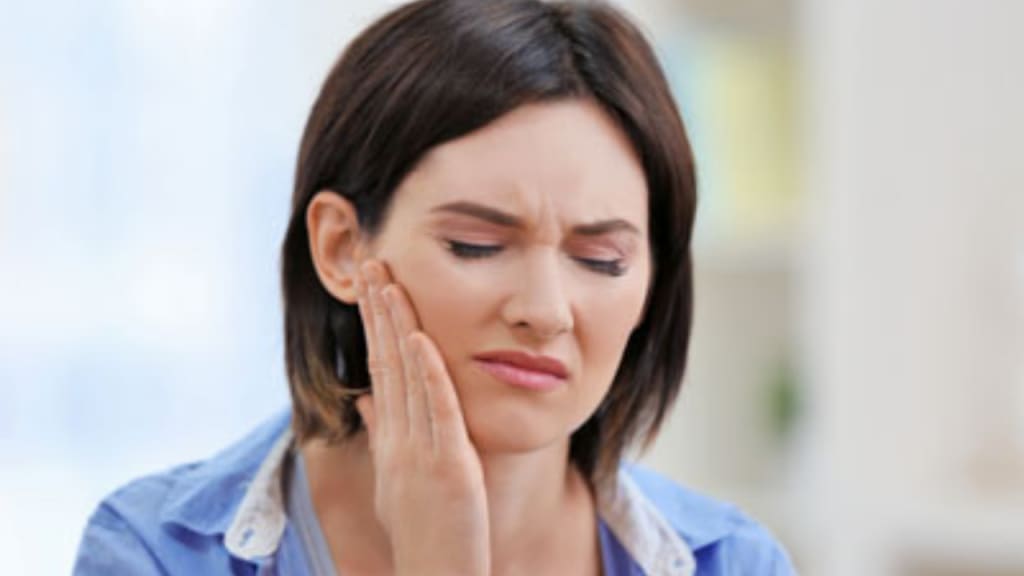10 Most Common Causes Of Toothache
Causes Of Toothache
By Estella WarrenPublished 3 years ago • 4 min read
Like
Share

Having a toothache can be very uncomfortable. Sometimes you may not even know what's causing the pain you feel in your teeth. But that's going to change. After reading this post, you will identify the 10 most common causes of toothaches and what can be done to alleviate the discomfort.
- Orthodontic alignment: Aside from the benefit of straightening crooked teeth, dental alignment systems like braces, retainers, and the likes can bring discomfort. You may experience pain immediately after adjustment - to tighten or move your teeth. This pain usually stops a few days later. However, should the pain increase and persist, see your orthodontist. They will adjust the appliance to make your daily life easy.
- Crooked teeth or affected wisdom teeth: You may have aches from crooked teeth - since they're not aligned, they put pressure on each other and may even change position. Wisdom teeth that haven't successfully erupted from the gum can also cause severe pain as they rankle beneath the gum line and often exert pressure on other teeth. Kindly report issues like these to your dentist, especially if you haven't done so already. In the case of crooked teeth, braces may be recommended, and you may need surgery to treat affected wisdom teeth.
- Brushing and flossing the wrong way: Cleaning your teeth requires some pressure; not so much that it could cause irritation, inflammation, and bleeding in the gum. Pay attention to the force you're applying when you brush or floss, as persistent and excessive pressure can recede the gums and weaken the teeth - causing more pain. See your dental hygienist London for proper guidance on teeth cleaning. A soft-bristled toothbrush is recommended for the teeth.
- Bruxism: A common reason for pain in the neck, jaw, tooth, and muscle is teeth grinding (bruxism). This problem is usually experienced at bedtime or in uncomfortable situations. Severe bruxism sees a tightly clenched jaw and a rocking of the upper and lower teeth. The consequences of this include soreness of the joints and jawbones, chipped or cracked teeth. These can be really painful! Use a customised mouthguard during sleep to prevent you from grinding the teeth.
- Impaired dental fillings or sealant: The tooth's sensitive parts are often protected by fillings used in covering up fractures or holes in teeth. Should anything happen to these coverings, the teeth are laid bare to bacteria, particles of food, and extreme temperatures. You will experience a pain that ranges from a dull ache to a sharp, biting sensation. If your filling gets damaged, see your dentist immediately for treatment. This will prevent further decay or aggravated pain.
- Temperature sensitivity: A sensation on your teeth during or after drinking a hot or cold beverage is usually linked to teeth sensitivity. This could imply a wearing down of your enamel and exposure of the underlying dentin (the layer housing the tooth nerves). It may also be caused by a teeth whitening done recently. You can keep these nerves free from severe temperature by using an anti-sensitivity toothpaste. Speak with your dentist to help recommend the best toothpaste or other treatments.
- Fractured teeth: Accidents during sports, a fall, or biting on hard and sticky substances can chip or break your teeth. Do you feel pain in a fractured tooth? This means the fracture has spread to where the nerve endings are located - the centre of the tooth, and the pain can be top-level. You may not experience this immediately a tooth is fractured. It develops with time as the damage gets worse. We usually recommend an urgent appointment with your dentist to treat all teeth fractures as soon as possible. If they worsen, the pain will be great!
- Gum disease: People with gum disease experience red bleeding gums, dull pain in the mouth, and toothache often. Inflammation of the gums and oral bone is a common cause of this problem. Untreated gum disease causes loss or damage to the gums, bones, and teeth. Surgery may be recommended to treat any infection in the mouth.
- Tooth abscess: A serious decay in the teeth that affects the root under the visible tooth may be a sign of an infected root and surrounding tissues. Here, a throbbing pain will move throughout the entire teeth such that identifying the particular affected teeth won't be easy. A tooth abscess can cause loss of bone and tissue - a delicate issue! Report this problem to your dentist as quickly as you can for treatment.
- Tooth decay: As old as this problem is, it remains the commonest cause of pain in the teeth. You certainly do know about tooth decay. It's a problem anyone can have. If the decay gets to the dentin, the tooth and surrounding area will bring about significant pain. If the dentin gets harmed, then teeth sensitivity and cavity sets in. Should you feel a sharp pain rather than an ache, the decay may have spread to the tooth centre. You will feel excruciating pain and may not be able to function effectively every day.
Are you experiencing any of these? Visit here to book a dental hygienist appointment. An early examination will stop a minor problem from escalating to a bigger one.





Comments
There are no comments for this story
Be the first to respond and start the conversation.